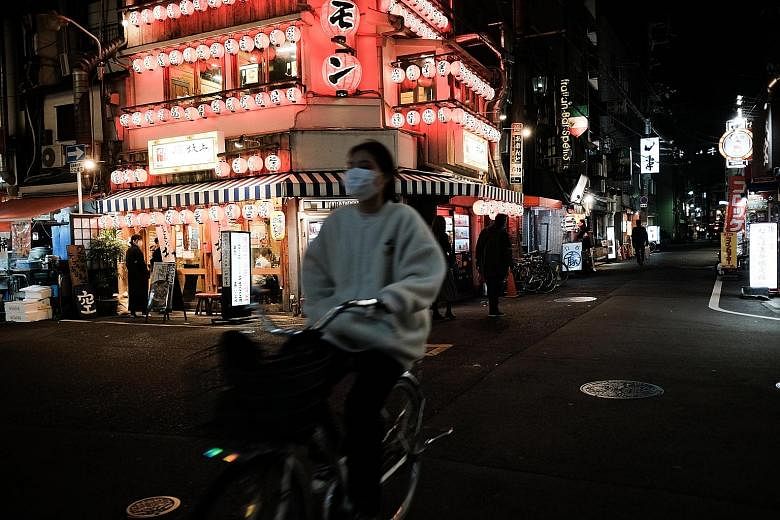Japan is facing a dire medical crisis as the number of patients with severe Covid-19 symptoms tripled in one month to hit a new high of 505 yesterday.
The death toll is also mounting rapidly, with a new one-day record of 45 deaths yesterday.
Rising in tandem with the worsening situation is anger with the response of Prime Minister Yoshihide Suga's government to the crisis.
Prefecture leaders accused the national government of simply passing the buck to them.
Osaka Governor Hirofumi Yoshimura, who declared a "red alert" in his prefecture on Thursday, bemoaned how Parliament did not consider laws for Covid-19 in the light of the medical crisis.
Doctors also slammed the seeming lack of urgency, citing the stopgap measures mooted by politicians, including the transfer of non-infectious disease specialists to help in the Covid-19 fight.
In a widely shared Facebook post, Dr Hideaki Oka of the Saitama Medical Centre in the city of Kawagoe, north of Tokyo, compared the situation to flight operations.
He wrote: "The current political decisions are akin to saying that everything is fine because there are still planes left, even if they are being flown by mobilised inexperienced pilots. Is this really safe?"
This comes as hospital beds are in short supply, and doctors and nurses are being overworked to the point of exhaustion.
In Osaka, doctors and nurses are being transferred to the Osaka City Juso Hospital, which has been designated for Covid-19 patients.
About 25 hospital employees have quit since the start of the pandemic.
The Osaka City General Hospital has had to shut its cancer ward for patients aged 15 to 39 because there were not enough nurses to tend to them.
The Kobe City Medical Centre General Hospital has downsized its intensive care units, while the Sapporo City General Hospital is not taking in any new patients.
Hospital clusters have also been emerging, including one in the city of Asahikawa in Hokkaido with at least 214 Covid-19 infections.
Medical experts warn that hospitals in hard-hit areas are at a tipping point.
Expectant mothers and patients suffering from other conditions are being turned away amid the dire shortage of medical staff.
Mr Suga, however, insists that the government is responding "with the strongest sense of crisis".
At a news conference yesterday to mark the end of the Diet session, he pledged to "secure a sufficient reserve fund to be able to respond to whatever happens".
The Cabinet will compile its third emergency stimulus next week to provide further support to ailing businesses and medical institutions. Part of the stimulus will also go to a five-month extension of the Go To Travel domestic tourism campaign to June.
Japan logged at least 2,442 new cases yesterday, according to a tally by public broadcaster NHK.
That brought the total number of cases in the country to 158,411. A total of 2,306 people have died.
The capital added 449 new cases and the Tokyo Medical Association chairman Haruo Ozaki urged the government to take stronger measures rather than adopt haphazard, incoherent policies.

